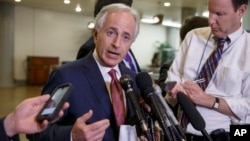U.S. senators of both major political parties are expressing growing skepticism that international negotiations with Iran will yield an accord that prevents Tehran from building a nuclear weapon. The comments come as Washington and Tehran suggest there will be no further extensions of nuclear talks that began after an interim accord reached in 2013.
One day after President Barack Obama said the time has come for Iran to decide on its nuclear program, members of the Senate Foreign Relations Committee met behind closed doors to hear from unnamed administration officials on the status of the talks and what, exactly, the United States knows about Iran’s current nuclear capabilities.
Committee Chairman Bob Corker, a Republican, emerged to make a somber assessment. “We really are in a position of managing proliferation now with the country of Iran,” he said.
The committee’s top Democrat, Senator Robert Menendez, echoed the concern, noting the United States was aiming to make sure Iran would need a one-year “break-out” period to build a nuclear weapon if an accord falters.
“Instead of preventing proliferation, we are managing proliferation. If we enter a new world order where we are going to manage proliferation, where a country could be a year away from the possibility of breaking out capabilities for nuclear weapons, that is a different and far more challenging world,” he said.
Corker said he wanted a negotiated settlement on Iran’s nuclear program. But he repeatedly expressed concerns that an accord might be weak on nuclear restrictions while providing Tehran with a massive economic boost when international sanctions were lifted.
“You’ve got a country that may be a screwdriver turn away from having a nuclear weapon. But in addition to that, they are going to have $130 billion [of new funds] available, and their economy will be growing. They will no longer be a rogue state,” he said.
Some Republican lawmakers, like Senator Marco Rubio, want to craft new economic sanctions against Tehran, despite administration warnings that such measures would torpedo negotiations.
“I do believe we should have sanctions in place that would kick in when these talks fail, as I unfortunately believe they will,” said Rubio.
Several Democrats declined to comment at all after emerging from the hearing, saying they could not comment on classified matters. Senator Jeanne Shaheen would only say her view of the nuclear negotiations has not changed and she puts the chance of reaching an accord at 50-50.
The current negotiating round ends in June, but participants are aiming to hammer out the framework for an accord by next month.




